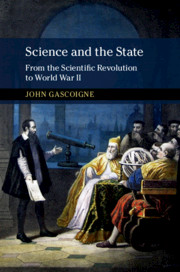Book contents
- Science and the State
- New Approaches to the History of Science and Medicine
- Science and the State
- Copyright page
- Dedication
- Contents
- Illustrations
- Abbreviations
- Preface
- Chronology
- 1 Introduction
- 2 The Renaissance Monarchy
- 3 Absolutism
- 4 Rivals to Absolutism
- 5 Revolution, Reaction and Reform, 1776–1850
- 6 An Expanding State, 1850–1914
- 7 From War to War, 1914–1945
- 8 Science, the State and Globalisation
- Epilogue
- Bibliography
- Index
- References
Bibliography
Published online by Cambridge University Press: 11 March 2019
- Science and the State
- New Approaches to the History of Science and Medicine
- Science and the State
- Copyright page
- Dedication
- Contents
- Illustrations
- Abbreviations
- Preface
- Chronology
- 1 Introduction
- 2 The Renaissance Monarchy
- 3 Absolutism
- 4 Rivals to Absolutism
- 5 Revolution, Reaction and Reform, 1776–1850
- 6 An Expanding State, 1850–1914
- 7 From War to War, 1914–1945
- 8 Science, the State and Globalisation
- Epilogue
- Bibliography
- Index
- References
- Type
- Chapter
- Information
- Science and the StateFrom the Scientific Revolution to World War II, pp. 220 - 242Publisher: Cambridge University PressPrint publication year: 2019



